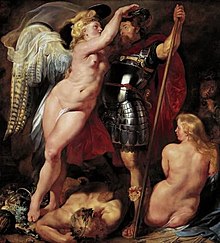


Greatness is a concept of a state of superiority affecting a person or object in a particular place or area. Greatness can also be attributed to individuals who possess a natural ability to be better than all others. An example of an expression of the concept in a qualified sense would be "Hector is the definition of greatness" or "Napoleon was one of the greatest wartime leaders". In the unqualified sense it might be stated "George Washington achieved greatness within his own lifetime", thus implying that "greatness" is a definite and identifiable quality. Application of the terms "great" and "greatness" is dependent on the perspective and subjective judgements of those who apply them.[1] Whereas in some cases the perceived greatness of a person, place or object might be agreed upon by many, this is not necessarily the case, and the perception of greatness may be both fiercely contested and highly idiosyncratic.[2]
Historically, in Europe, rulers were sometimes given the attribute "the Great", as in Alexander the Great, Frederick the Great, Alfred the Great and Catherine the Great. Starting with the Roman consul and general Pompey, the Latin equivalent Magnus was also used, as in Pompeius Magnus, Albertus Magnus, and Carolus Magnus. The English language uses the Latin term magnum opus, (literally "great work") to describe certain works of art and literature.
Since the publication of Francis Galton's Hereditary Genius in 1869, and especially with the accelerated development of intelligence tests in the early 1900s, there has been a vast amount of social scientific research published relative to the question of greatness. Much of this research does not actually use the term great in describing itself, preferring terms such as eminence, genius, exceptional achievement, etc.[3] Historically the major intellectual battles over this topic have focused around the questions of nature versus nurture or person versus context.[4] Today the importance of both dimensions is accepted by all, but disagreements over the relative importance of each are still reflected in variations in research emphases.[5]

- ^ Jerry L. Walls (2007). "The Wizard versus The General". In Jerry L. Walls; Gregory Bassham; Dick Vitale (eds.). Basketball and philosophy. University Press of Kentucky. pp. 129. ISBN 978-0813124353.
- ^ "Which One". shonmehta.com.
- ^ Albert, R.S. (ed) 1983. Genius and Eminence: The Social Psychology of Creativity and Exceptional Achievement. New York: Pergamon Press
- ^ Simonton, D.K. 2009. Genius 101. New York: Springer, e.g. Chs 4 & 6
- ^ Eysenck, H. 1995. Genius: The Natural History of Creativity. Cambridge, UK: Cambridge University Press vs Dorris. B. 2009. The Arrival of The Fittest: How The Great Become Great. (Lulu Url in Note 38 below)
© MMXXIII Rich X Search. We shall prevail. All rights reserved. Rich X Search
